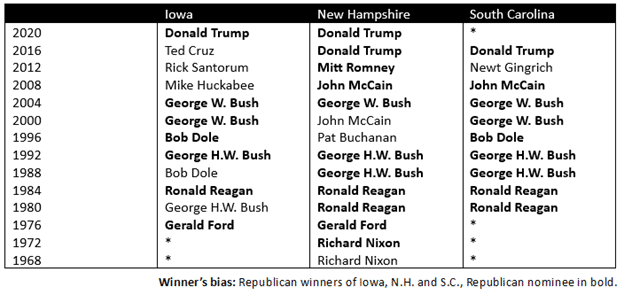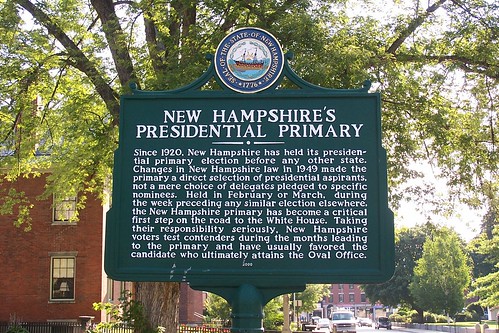After a record-setting near 30-point win in the Iowa caucus, former President Donald Trump has headed to New Hampshire to do what no candidate in a competitive Republican primary has ever done—win both Iowa and New Hampshire.
Incumbent presidents sweep the primaries all the time — when they don’t, or if the primaries are close, they usually lose — but not when the nomination is contested without an incumbent president running.

In 1976, then-President Gerald Ford won both Iowa and New Hampshire but the races were close and Reagan went on to win a number of states, and Ford ended up losing to Jimmy Carter.
But in 1980, with no incumbent Republican president, George H.W. Bush won Iowa and Ronald Reagan won New Hampshire.
In 1984, then-President Ronald Reagan won Iowa, New Hampshire and South Carolina while going on to be reelected.
In 1988, with no incumbent Republican president running, Bob Dole won Iowa and George H.W. Bush won New Hampshire.
In 1992, once again, incumbent George H.W. Bush won Iowa, New Hampshire and South Carolina, but better than expected showings by Pat Buchanan predicted Bush losing to Bill Clinton later that year.
In 1996, with no incumbent Republican president, Bob Dole won Iowa, Pat Buchanan won New Hampshire, and then Dole won South Carolina.
In 2000, with no incumbent Republican president, George W. Bush won Iowa, John McCain won New Hampshire and then Bush won South Carolina, going on to narrowly defeat Al Gore that year.
In 2004, then-President George W. Bush swept Iowa, New Hampshire and South Carolina, going on to a relatively easy win against John Kerry.
In 2008, with no sitting Republican president, Mike Huckabee won Iowa and John McCain won New Hampshire and South Carolina narrowly, predicting his later defeat to Barack Obama, which became a landslide after the financial crisis, markets crashing and bank bailouts were front and center in the fall of 2008.
In 2012, with no sitting Republican president, Rick Santorum won Iowa narrowly, Mitt Romney won New Hampshire and Newt Gingrich won South Carolina, the inconsistent outcomes of which predicted Romney’s inevitable defeat to Obama.
In 2016, with no incumbent Republican, Ted Cruz won Iowa and Donald Trump won New Hampshire and South Carolina, going on to defeat Hillary Clinton later that year.
And in 2020, then-President Donald Trump swept the primaries, winning Iowa, New Hampshire and South Carolina.
Again, no Republican candidate in a competitive race for the nomination in history has won both Iowa and New Hampshire. Sitting presidents do it all the time, but Trump isn’t a sitting president.
The last two polls show Trump ahead of former South Carolina Republican Gov. Nikki Haley, 52 percent to 38 percent in the St. Anselm poll, and 50 percent to 36 percent in the Boston Globe-Suffolk poll after both Chris Christie and Vivek Ramaswamy dropped out, with their supporters’ votes going roughly equally to Trump and Haley, respectively.
In fact, Trump has led 94 percent of all the polls taken in New Hampshire this cycle (Florida Republican Gov. Ron DeSantis led a couple of them very early in the process), and so if Haley managed to win in New Hampshire, it would objectively be a surprise, but not necessarily fatal to Trump, since it would merely be the competitive primary horse race reasserting itself.
Usually, New Hampshire bucks Iowa, and so there’s still a few days for Trump’s opponents to make up lost ground and make the race for the Republican nomination interesting.
But if they cannot, and if Trump sweeps the early states Iowa, New Hampshire and South Carolina — Trump has led 100 percent of the polls taken in South Carolina this cycle — 2024 has the makings of being one of the greatest blowouts in not just GOP primary history, but all competitive presidential primaries. That’s interesting, too, but for different reasons.
Although Trump is not the incumbent, what was seen in Iowa, and in the polls taken so far, is indeed the incumbency advantage. We’ll see if it shows up again in New Hampshire on Jan. 23. My thinking throught this process is that the former president would be very difficult to defeat, so it’s fun to watch to see how good of a bet that was or not. Stay tuned.
Robert Romano is the Vice President of Public Policy at Americans for Limited Government Foundation.
To view online: https://dailytorch.com/2024/01/could-trump-sweep-the-primaries/
